Contemporary Nursing Issues and Innovations Report - Healthcare
VerifiedAdded on 2022/10/19
|6
|1137
|34
Report
AI Summary
This report explores contemporary nursing issues and innovations, focusing on the role of case managers in healthcare settings. It begins with an introduction to the importance of healthcare coverage and the role of case managers in facilitating patient care. The report then presents an interview with a case manager, Ms. Nikita Wells, detailing her responsibilities, which include coordinating care, managing caseloads, advocating for patients, and assisting them in achieving their health goals. The report highlights the similarities between the case management process and the nursing process, emphasizing their shared stages of assessment, planning, implementation, and evaluation. It discusses how case managers improve patient outcomes by supporting families and advocating for patient safety. The report also covers the required education and certifications for case managers. In conclusion, the report emphasizes the essential role of case managers in clinical settings and their impact on patient care, providing a comprehensive overview of their functions and the skills required for effective practice.
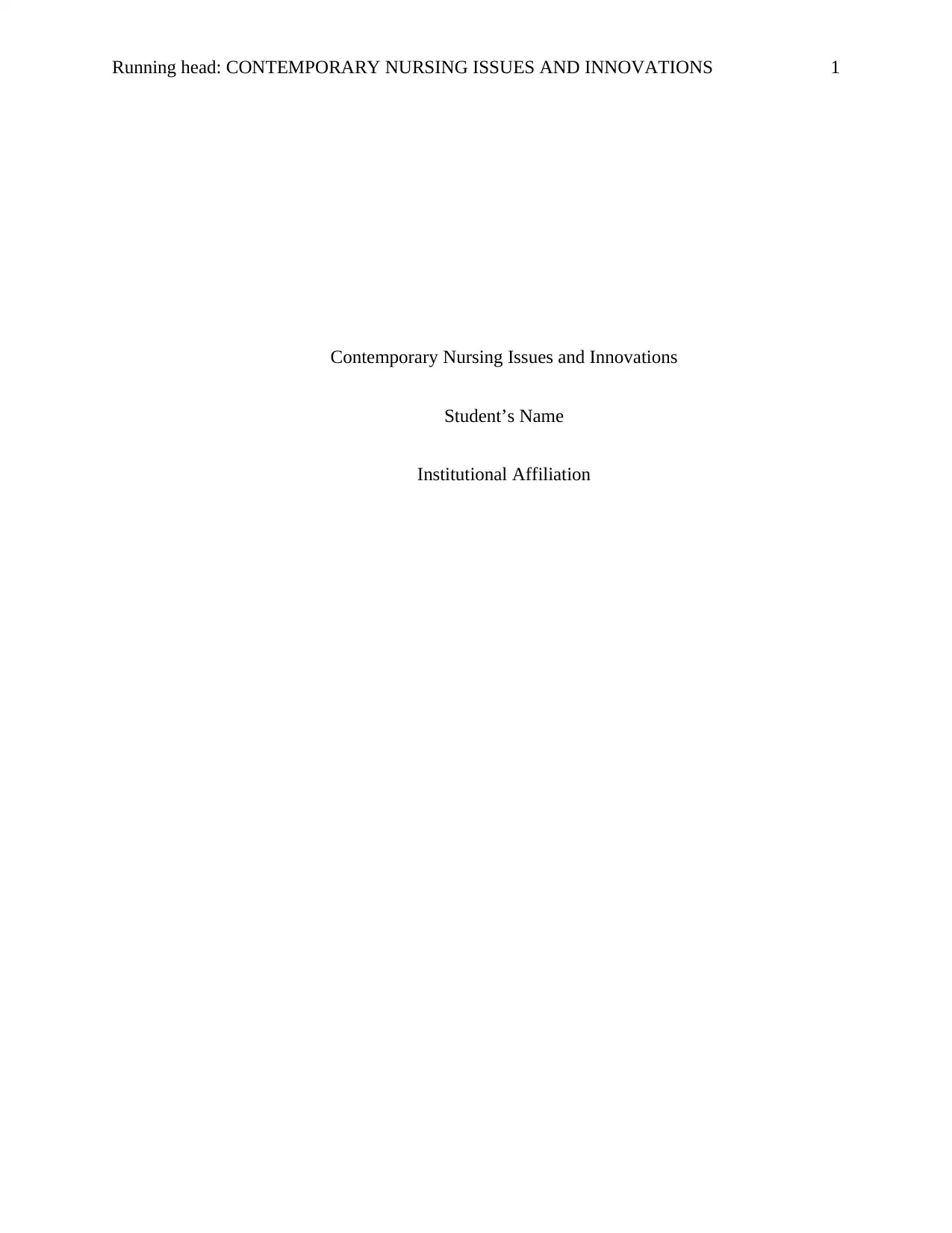
Running head: CONTEMPORARY NURSING ISSUES AND INNOVATIONS 1
Contemporary Nursing Issues and Innovations
Student’s Name
Institutional Affiliation
Contemporary Nursing Issues and Innovations
Student’s Name
Institutional Affiliation
Paraphrase This Document
Need a fresh take? Get an instant paraphrase of this document with our AI Paraphraser
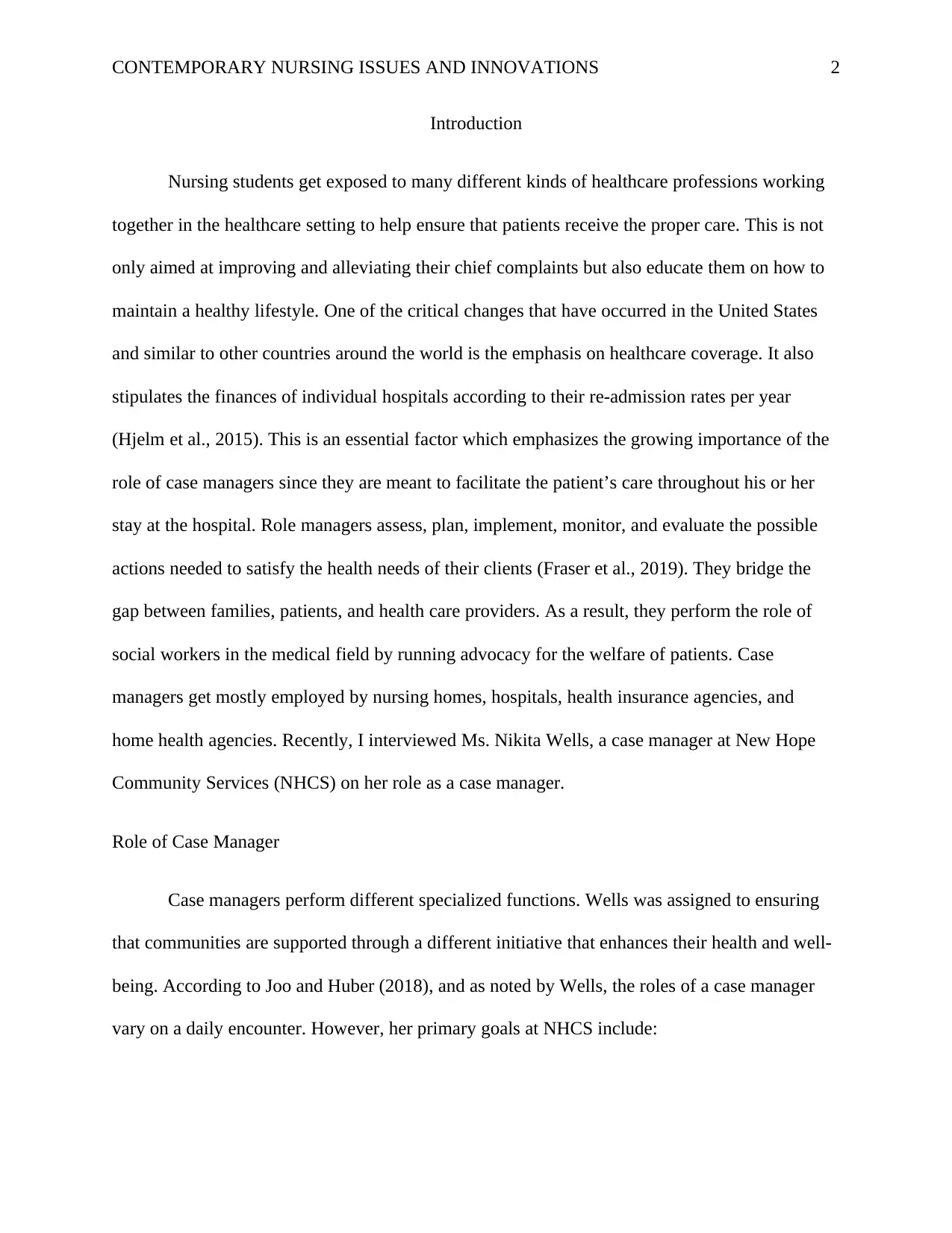
CONTEMPORARY NURSING ISSUES AND INNOVATIONS 2
Introduction
Nursing students get exposed to many different kinds of healthcare professions working
together in the healthcare setting to help ensure that patients receive the proper care. This is not
only aimed at improving and alleviating their chief complaints but also educate them on how to
maintain a healthy lifestyle. One of the critical changes that have occurred in the United States
and similar to other countries around the world is the emphasis on healthcare coverage. It also
stipulates the finances of individual hospitals according to their re-admission rates per year
(Hjelm et al., 2015). This is an essential factor which emphasizes the growing importance of the
role of case managers since they are meant to facilitate the patient’s care throughout his or her
stay at the hospital. Role managers assess, plan, implement, monitor, and evaluate the possible
actions needed to satisfy the health needs of their clients (Fraser et al., 2019). They bridge the
gap between families, patients, and health care providers. As a result, they perform the role of
social workers in the medical field by running advocacy for the welfare of patients. Case
managers get mostly employed by nursing homes, hospitals, health insurance agencies, and
home health agencies. Recently, I interviewed Ms. Nikita Wells, a case manager at New Hope
Community Services (NHCS) on her role as a case manager.
Role of Case Manager
Case managers perform different specialized functions. Wells was assigned to ensuring
that communities are supported through a different initiative that enhances their health and well-
being. According to Joo and Huber (2018), and as noted by Wells, the roles of a case manager
vary on a daily encounter. However, her primary goals at NHCS include:
Introduction
Nursing students get exposed to many different kinds of healthcare professions working
together in the healthcare setting to help ensure that patients receive the proper care. This is not
only aimed at improving and alleviating their chief complaints but also educate them on how to
maintain a healthy lifestyle. One of the critical changes that have occurred in the United States
and similar to other countries around the world is the emphasis on healthcare coverage. It also
stipulates the finances of individual hospitals according to their re-admission rates per year
(Hjelm et al., 2015). This is an essential factor which emphasizes the growing importance of the
role of case managers since they are meant to facilitate the patient’s care throughout his or her
stay at the hospital. Role managers assess, plan, implement, monitor, and evaluate the possible
actions needed to satisfy the health needs of their clients (Fraser et al., 2019). They bridge the
gap between families, patients, and health care providers. As a result, they perform the role of
social workers in the medical field by running advocacy for the welfare of patients. Case
managers get mostly employed by nursing homes, hospitals, health insurance agencies, and
home health agencies. Recently, I interviewed Ms. Nikita Wells, a case manager at New Hope
Community Services (NHCS) on her role as a case manager.
Role of Case Manager
Case managers perform different specialized functions. Wells was assigned to ensuring
that communities are supported through a different initiative that enhances their health and well-
being. According to Joo and Huber (2018), and as noted by Wells, the roles of a case manager
vary on a daily encounter. However, her primary goals at NHCS include:
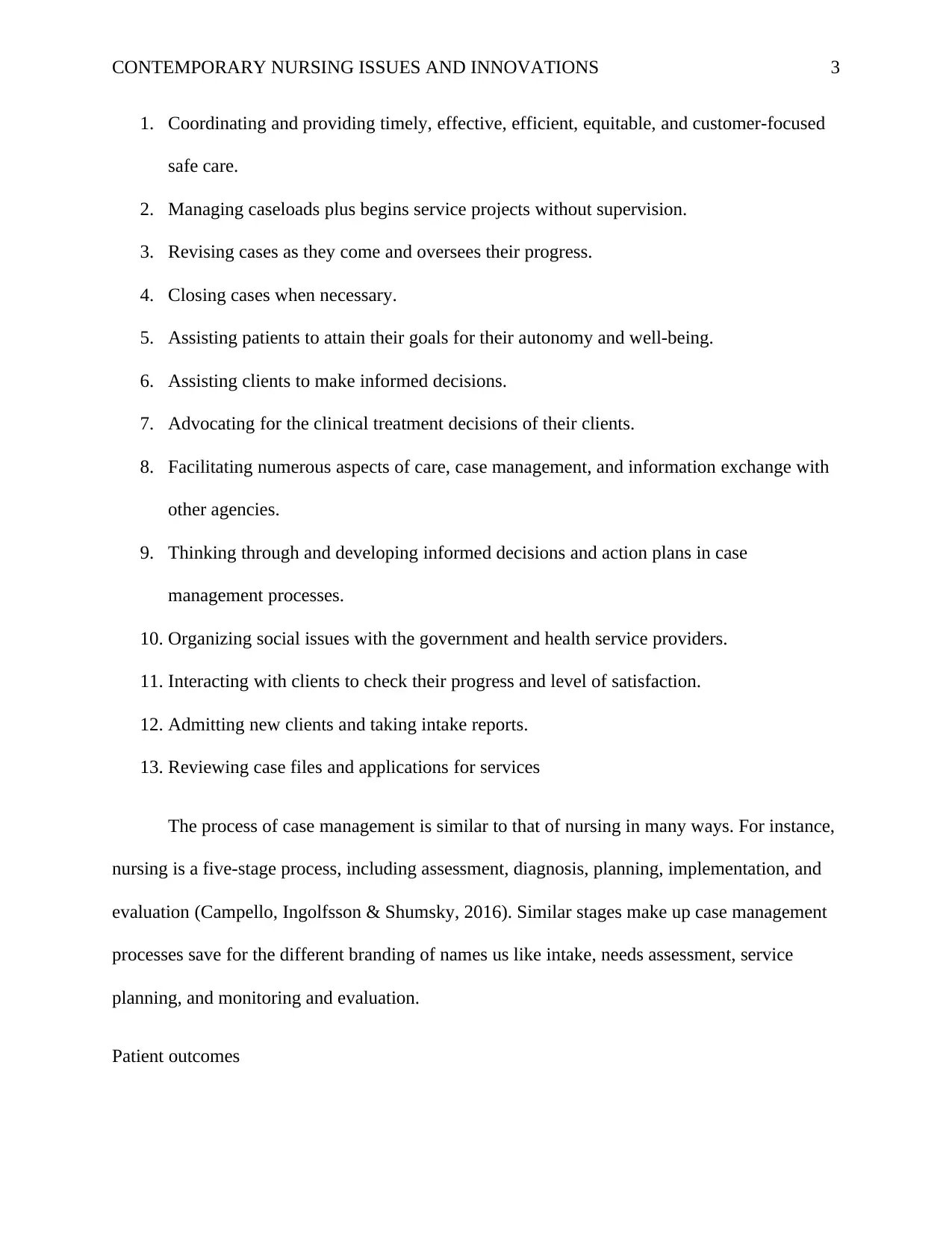
CONTEMPORARY NURSING ISSUES AND INNOVATIONS 3
1. Coordinating and providing timely, effective, efficient, equitable, and customer-focused
safe care.
2. Managing caseloads plus begins service projects without supervision.
3. Revising cases as they come and oversees their progress.
4. Closing cases when necessary.
5. Assisting patients to attain their goals for their autonomy and well-being.
6. Assisting clients to make informed decisions.
7. Advocating for the clinical treatment decisions of their clients.
8. Facilitating numerous aspects of care, case management, and information exchange with
other agencies.
9. Thinking through and developing informed decisions and action plans in case
management processes.
10. Organizing social issues with the government and health service providers.
11. Interacting with clients to check their progress and level of satisfaction.
12. Admitting new clients and taking intake reports.
13. Reviewing case files and applications for services
The process of case management is similar to that of nursing in many ways. For instance,
nursing is a five-stage process, including assessment, diagnosis, planning, implementation, and
evaluation (Campello, Ingolfsson & Shumsky, 2016). Similar stages make up case management
processes save for the different branding of names us like intake, needs assessment, service
planning, and monitoring and evaluation.
Patient outcomes
1. Coordinating and providing timely, effective, efficient, equitable, and customer-focused
safe care.
2. Managing caseloads plus begins service projects without supervision.
3. Revising cases as they come and oversees their progress.
4. Closing cases when necessary.
5. Assisting patients to attain their goals for their autonomy and well-being.
6. Assisting clients to make informed decisions.
7. Advocating for the clinical treatment decisions of their clients.
8. Facilitating numerous aspects of care, case management, and information exchange with
other agencies.
9. Thinking through and developing informed decisions and action plans in case
management processes.
10. Organizing social issues with the government and health service providers.
11. Interacting with clients to check their progress and level of satisfaction.
12. Admitting new clients and taking intake reports.
13. Reviewing case files and applications for services
The process of case management is similar to that of nursing in many ways. For instance,
nursing is a five-stage process, including assessment, diagnosis, planning, implementation, and
evaluation (Campello, Ingolfsson & Shumsky, 2016). Similar stages make up case management
processes save for the different branding of names us like intake, needs assessment, service
planning, and monitoring and evaluation.
Patient outcomes
⊘ This is a preview!⊘
Do you want full access?
Subscribe today to unlock all pages.

Trusted by 1+ million students worldwide
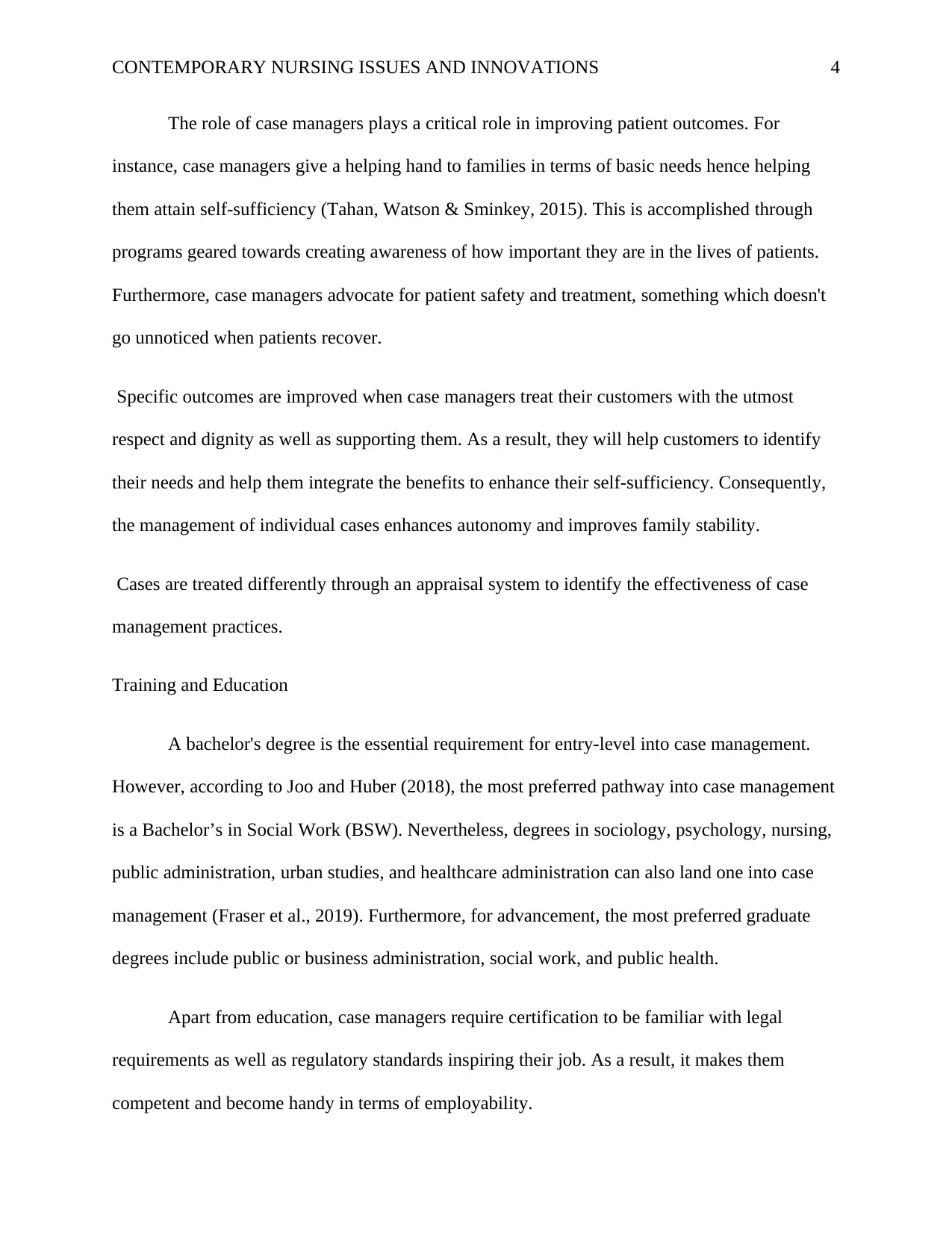
CONTEMPORARY NURSING ISSUES AND INNOVATIONS 4
The role of case managers plays a critical role in improving patient outcomes. For
instance, case managers give a helping hand to families in terms of basic needs hence helping
them attain self-sufficiency (Tahan, Watson & Sminkey, 2015). This is accomplished through
programs geared towards creating awareness of how important they are in the lives of patients.
Furthermore, case managers advocate for patient safety and treatment, something which doesn't
go unnoticed when patients recover.
Specific outcomes are improved when case managers treat their customers with the utmost
respect and dignity as well as supporting them. As a result, they will help customers to identify
their needs and help them integrate the benefits to enhance their self-sufficiency. Consequently,
the management of individual cases enhances autonomy and improves family stability.
Cases are treated differently through an appraisal system to identify the effectiveness of case
management practices.
Training and Education
A bachelor's degree is the essential requirement for entry-level into case management.
However, according to Joo and Huber (2018), the most preferred pathway into case management
is a Bachelor’s in Social Work (BSW). Nevertheless, degrees in sociology, psychology, nursing,
public administration, urban studies, and healthcare administration can also land one into case
management (Fraser et al., 2019). Furthermore, for advancement, the most preferred graduate
degrees include public or business administration, social work, and public health.
Apart from education, case managers require certification to be familiar with legal
requirements as well as regulatory standards inspiring their job. As a result, it makes them
competent and become handy in terms of employability.
The role of case managers plays a critical role in improving patient outcomes. For
instance, case managers give a helping hand to families in terms of basic needs hence helping
them attain self-sufficiency (Tahan, Watson & Sminkey, 2015). This is accomplished through
programs geared towards creating awareness of how important they are in the lives of patients.
Furthermore, case managers advocate for patient safety and treatment, something which doesn't
go unnoticed when patients recover.
Specific outcomes are improved when case managers treat their customers with the utmost
respect and dignity as well as supporting them. As a result, they will help customers to identify
their needs and help them integrate the benefits to enhance their self-sufficiency. Consequently,
the management of individual cases enhances autonomy and improves family stability.
Cases are treated differently through an appraisal system to identify the effectiveness of case
management practices.
Training and Education
A bachelor's degree is the essential requirement for entry-level into case management.
However, according to Joo and Huber (2018), the most preferred pathway into case management
is a Bachelor’s in Social Work (BSW). Nevertheless, degrees in sociology, psychology, nursing,
public administration, urban studies, and healthcare administration can also land one into case
management (Fraser et al., 2019). Furthermore, for advancement, the most preferred graduate
degrees include public or business administration, social work, and public health.
Apart from education, case managers require certification to be familiar with legal
requirements as well as regulatory standards inspiring their job. As a result, it makes them
competent and become handy in terms of employability.
Paraphrase This Document
Need a fresh take? Get an instant paraphrase of this document with our AI Paraphraser
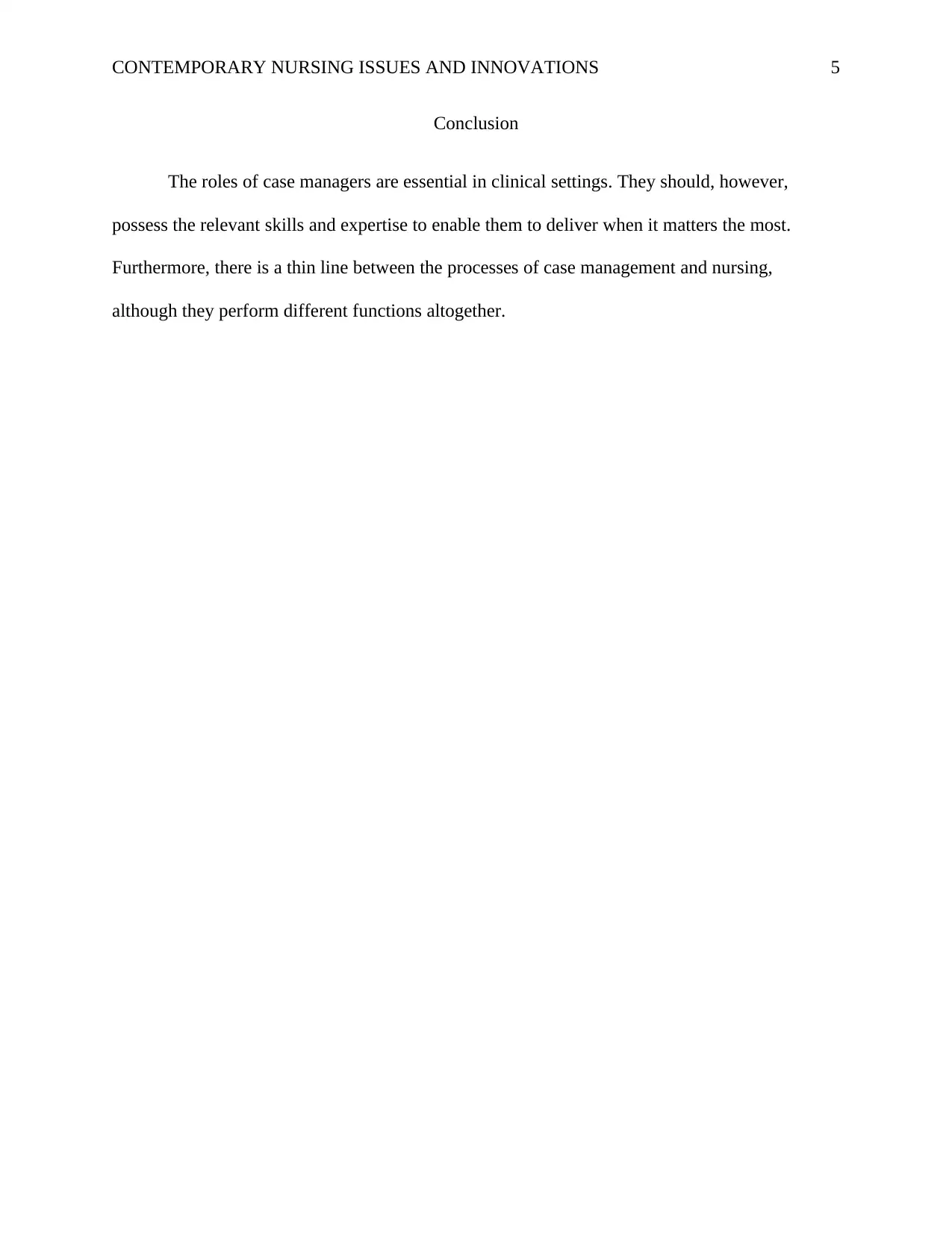
CONTEMPORARY NURSING ISSUES AND INNOVATIONS 5
Conclusion
The roles of case managers are essential in clinical settings. They should, however,
possess the relevant skills and expertise to enable them to deliver when it matters the most.
Furthermore, there is a thin line between the processes of case management and nursing,
although they perform different functions altogether.
Conclusion
The roles of case managers are essential in clinical settings. They should, however,
possess the relevant skills and expertise to enable them to deliver when it matters the most.
Furthermore, there is a thin line between the processes of case management and nursing,
although they perform different functions altogether.
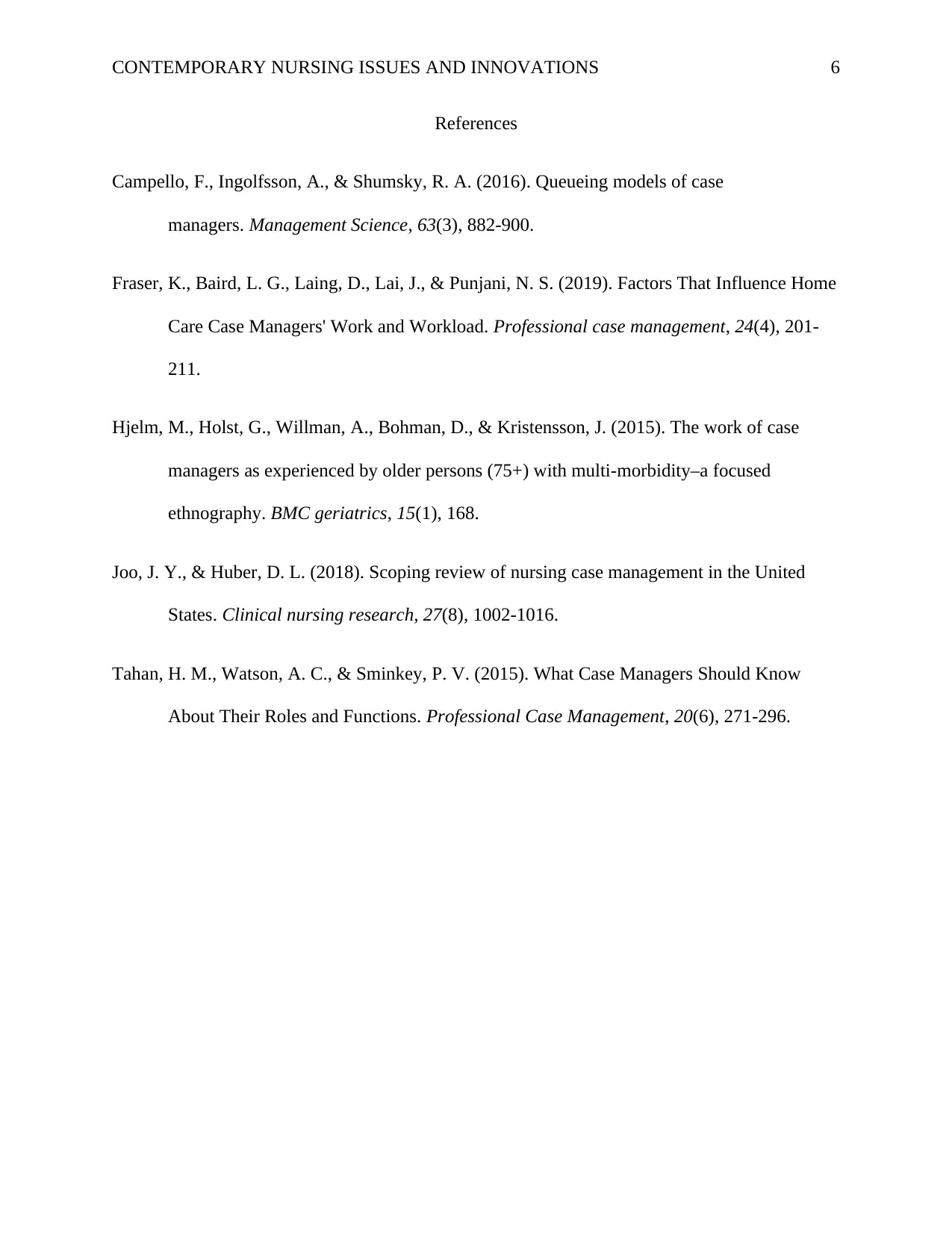
CONTEMPORARY NURSING ISSUES AND INNOVATIONS 6
References
Campello, F., Ingolfsson, A., & Shumsky, R. A. (2016). Queueing models of case
managers. Management Science, 63(3), 882-900.
Fraser, K., Baird, L. G., Laing, D., Lai, J., & Punjani, N. S. (2019). Factors That Influence Home
Care Case Managers' Work and Workload. Professional case management, 24(4), 201-
211.
Hjelm, M., Holst, G., Willman, A., Bohman, D., & Kristensson, J. (2015). The work of case
managers as experienced by older persons (75+) with multi-morbidity–a focused
ethnography. BMC geriatrics, 15(1), 168.
Joo, J. Y., & Huber, D. L. (2018). Scoping review of nursing case management in the United
States. Clinical nursing research, 27(8), 1002-1016.
Tahan, H. M., Watson, A. C., & Sminkey, P. V. (2015). What Case Managers Should Know
About Their Roles and Functions. Professional Case Management, 20(6), 271-296.
References
Campello, F., Ingolfsson, A., & Shumsky, R. A. (2016). Queueing models of case
managers. Management Science, 63(3), 882-900.
Fraser, K., Baird, L. G., Laing, D., Lai, J., & Punjani, N. S. (2019). Factors That Influence Home
Care Case Managers' Work and Workload. Professional case management, 24(4), 201-
211.
Hjelm, M., Holst, G., Willman, A., Bohman, D., & Kristensson, J. (2015). The work of case
managers as experienced by older persons (75+) with multi-morbidity–a focused
ethnography. BMC geriatrics, 15(1), 168.
Joo, J. Y., & Huber, D. L. (2018). Scoping review of nursing case management in the United
States. Clinical nursing research, 27(8), 1002-1016.
Tahan, H. M., Watson, A. C., & Sminkey, P. V. (2015). What Case Managers Should Know
About Their Roles and Functions. Professional Case Management, 20(6), 271-296.
⊘ This is a preview!⊘
Do you want full access?
Subscribe today to unlock all pages.

Trusted by 1+ million students worldwide
1 out of 6
Related Documents
Your All-in-One AI-Powered Toolkit for Academic Success.
+13062052269
info@desklib.com
Available 24*7 on WhatsApp / Email
![[object Object]](/_next/static/media/star-bottom.7253800d.svg)
Unlock your academic potential
Copyright © 2020–2026 A2Z Services. All Rights Reserved. Developed and managed by ZUCOL.




